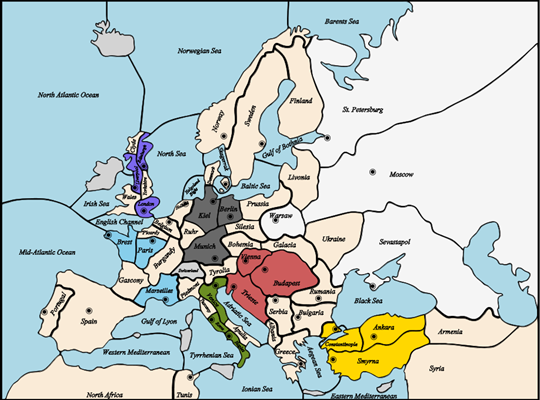Been playing Diplomacy for the past while in college with the games society, and thought why not try and get a game of this going with the Culchies ![]()
What is Diplomacy?
Diplomacy is a strategic board game created by Allan B. Calhamer in 1954 and released commercially in 1959. Its main distinction from most board wargames is negotiation: Players spend much of their time forming (and betraying) alliances with other players. Set in Europe just before the beginning of World War I , Diplomacy is played by seven players, each controlling the armed forces of a major European power. Each player aims to move his or her units (armies and fleets) – and defeat those of others – to win possession of a majority of strategic cities and provinces marked as “supply centers” on the map; these supply centers allow players who control them to produce more units.
What is the aim of the game?
The aim of Diplomacy is to control 18 of the map’s 34 supply centres at the end of Fall in any year. Doing so wins the game.
Below is the game board, at the start of the game.
The major powers are: England, France, Italy, Austria, Turkey, Germany (black) and Russia (white)
How do you play?
Diplomacy is played in “years”, with each year having two distinct phases: Spring and Fall. For each phase, players must secretly write down their orders for their units. Once all players have submitted orders, all orders are revealed and executed simultaneously.
Before orders and written and executed, there is a phase of negotiation, where players may converse with each other, either publicly or in private, in order to create alliances or agreements with each other. None of these informal alliances are binding, so trust and communication is a key part of this game.
Units may be ordered to hold, move, support, or convoy. Hold means your unit stays put and does nothing. Moving means your unit moves from one region to an adjacent region. Support means one of your units helps another one of your units to do something. Convoy allows your fleets to move your armies across sea regions.
All units have equal strength, no unit is more powerful than any other. Only one unit may occupy one region at any time. This is where support is key. Supporting your unit essentially gives your unit a strength of two, meaning that if that unit were to move into a region containing a unit with no support, that defending unit is dislodged and must retreat.
At the end of the Fall movement and retreat phase, then the supply centres are recalculated, and units may be built or units must be removed accordingly. Once all the neutral supply centres at the start of the game are taken, in order for any player to gain more units, must come at the expense of another player.
So what is it that I’m proposing?
I am proposing that we start up a game by e-mail of Diplomacy here on Culch.ie. I will act as gamemaster, being sent orders by all players and executing them before posting results and deadlines and what needs to be done next etc. etc. Seven of you will volunteer to play the game as one of the seven nations. Once we have seven people, the nations will be assigned by random draw and the game will begin. Note that this assignment of nations is the ONLY random element in the game.
Here is the complete rulebook if you would like to gaze over it.
So, who wants in? ![]()
Who are our Diplomats?
- Byrne
- Sinéad
- Rick








You…are a crazy person.
And we have our first volunteer
I’m SO in. I like games. I like to WIN.
Hehehe, more
victimsplayersI’m scared of things like this.
But I used to like playing Risk.
We look like the 4 saddest geeks anywhere right now…
Nothing wrong with being a sad geek, especially if it means we can get the game going before the end of the month